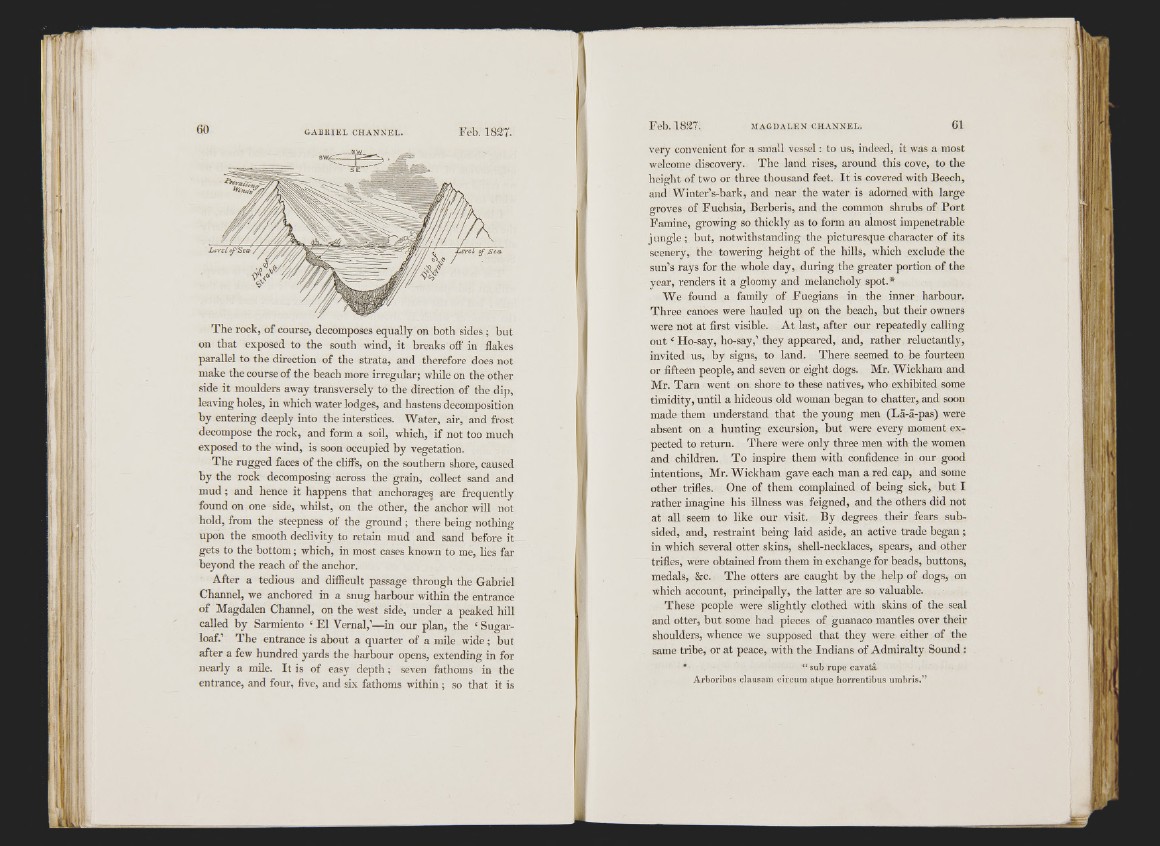
Ifi \
la ! .
iI
I.
!■;
I!)
Pr:
[ ■ '
! . ! '
I Si t !
,cvel gf ,sca
The rock, of course, decomposes equally on both sides ; but
on that exposed to the south Avind, it breaks off in flakes
parallel to the direction of the strata, and therefore does not
make the course of the beach more irregular; Avhileon the other
side it moidders aAvay transversely to the direction of the dip,
leaving holes, in Avhich Avater lodges, and hastens decomposition
by entering deeply into the interstices. AVater, air, and frost
decompose the rock, and form a soil, Avhich, if not too much
exposed to the Avind, is soon occupied by vegetation.
The rugged faces of the cliffs, on the southern shore, caused
by the rock decomposing across the grain, collect sand and
m u d ; and hence it happens that anchorages are frequently
found on one side, Avhilst, on the other, the anchor Avill not
hold, from the steepness of the g ro u n d ; there being nothing
upon the smooth declivity to retain mud and sand before it
gets to the bottom; Avhich, in most cases known to me, lies far
beyond the reach of the anchor.
After a tedious and difficult passage through the Gabriel
Channel, we anchored in a snug harbour within the entrance
of Magdalen Channel, on the west side, under a peaked hill
called by Sarmiento ‘ El Vernal,’—in our plan, the ‘ Sugar-
loaf.’ The entrance is about a quarter of a mile wide; but
after a few hundred yards the harbour opens, extending in for
nearly a mile. It is of easy depth; seA-en fathoms in the
entrance, and four, five, and six fathoms Avithin ; so that it is
very convenient for a small vessel: to us, indeed, it was a most
AA-elcome discovery. The land rises, around this cove, to the
height of two or three thousand feet. It is covered with Beech,
and Winter’s-bark, and near the water is adorned Avith large
groves of Fuchsia, Berberis, and the common shrubs of Port
Famine, growing so thickly as to form an almost impenetrable
jungle; but, notAvithstanding the picturesque character of its
scenery, the toAvering height of the hills, which exclude the
sun’s rays for the whole day, during the greater portion of the
year, renders it a gloomy and melancholy spot.*
We found a family of Fuegians in the inner harbour.
Three canoes were hauled up on the beach, but their owners
were not at first visible. At last, after our repeatedly calling
out ‘ Ho-say, ho-say,’ they appeared, and, rather reluctantly,
invited us, by signs, to land. There seemed to be fourteen
or fifteen people, and seven or eight dogs. Mr. Wickham and
Mr. Tarn went on shore to these natives, who exhibited some
timidity, until a hideous old Avoman began to chatter, and soon
made them understand that the young men (La-a-pas) were
absent on a hunting excursion, but were every moment expected
to return. There Avere only three men Avith the women
and children. To inspire them with confidence in our good
intentions, Mr. Wickham gave each man a red cap, and some
other trifles. One of them complained of being sick, but I
rather imagine his illness was feigned, and the others did not
at all seem to like our visit. By degrees their fears subsided,
and, restraint being laid aside, an active trade began;
in which several otter skins, shell-necklaces, spears, and other
trifles, were obtained from them in exchange for beads, buttons,
medals, &c. The otters are caught by the help of dogs, on
which account, principally, the latter are so valuable.
These people were slightly clothed with skins of the seal
and otter, but some had pieces of guanaco mantles over their
shoulders, whence we supposed that they were either of the
same tribe, or at peace, with the Indians of Admiralty Sound :
* “ sub rupe cavata
Arboribus clausam clrcum atque horrentibus umbris.”
' I